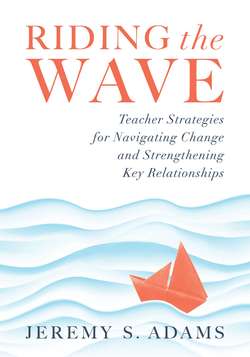Читать книгу Riding the Wave - Jeremy S. Adams - Страница 18
На сайте Литреса книга снята с продажи.
CHAPTER 1
Recognizing the Need for Self-Care
ОглавлениеThe last day of a teacher’s career is instructive for those still teaching. Some teachers enthusiastically reach for the door of retirement without a single moment of pause or reflection. Most soon-to-be retirees, however, take the opportunity to look back at those of us still living the life of a classroom teacher. What they say to us is both fascinating and enlightening because teachers who stand at the door of retirement are usually imbued with a powerful tone of honesty. Sometimes their honesty is brutal, sometimes it is humorous, and sometimes it is inspiring. What they reveal is instructive because it is a form of pedagogic wisdom they wish they had received when they were younger, when they sat where teachers in the middle of their careers now find themselves. Honesty, it seems, can be hard to come by until the twilight of one’s career.
Some remark on how much things have changed in schools and in society. Some reminisce about students and colleagues from long ago. Some tell amusing stories, while others simply break down in tears. But what they all express is a central truth about the teaching profession: the peaks of our profession are extraordinarily high, and the valleys are inordinately low. For typical teachers, the peaks and the valleys are almost always oriented around the lives of the students they teach, not the emotional states experienced by the teachers themselves. Notions of well-being and mental health are almost never discussed because such a discussion would place the teacher at the center of the educational universe. Many teachers, to their detriment, and until the end of their teaching days, are loath to think in these terms.
This job can and will make us weep, because sometimes, students disappoint or hurt us; colleagues frustrate or anger us; a nagging feeling tells us we are not the teachers we always dreamed we would be; and we feel powerless. Certainly, on my last day, far into the future, I will remember my dear friend and closest colleague, with whom I taught for almost two decades and who tragically died of cancer at the young age of forty. I will remember the agony of going into work the next day, of sitting in a classroom surrounded by the hundred students we had in common. I, like many teachers, will also remember decades of students who the world did not treat particularly well, who were victims of mental illness, substance abuse, or their own poor decisions. Indeed, a full account of a teaching career stares down into the valley of one’s pain and disappointments, and the closing of my career will surely bring these feelings and experiences to the surface.
But upon retiring, I won’t forget to look up at the many peaks that I traveled, recalling the classroom moments brimming with hope and transformation. I will almost certainly take pride in the contributions of my former students, some of whom are Broadway stars and some of whom are entrepreneurs and moguls within their professions. Hundreds are now teachers, and thousands do their part every day to make the world just a little bit better. Most of all, I will take delight in how many of them I now consider my friends.
Getting to the last day of one’s teaching career—no matter if it is forty years or one year away—in a positive and impactful manner requires that one honestly assess just how difficult teaching can be for individuals within the profession. Teachers are often hesitant to reveal their struggles during their careers for fear of ever distracting from a student-centric learning environment, but this hesitation must end for a simple reason: an era of constant and unending change in education places unique pressures and burdens on teachers as individuals.
Learning how to conquer these challenges is no small task. But teachers can conquer them if they have the tools and wisdom necessary to address their struggles and maintain a positive, productive outlook during their career. Fortunately, we have wisdom in our midst—wisdom found in fellow teachers, voluminous educational research, and a shared and common profession. In this chapter, we’ll make their wisdom our own by examining the cumulative toll of the 21st century, considering teacher stress and the symptoms of burnout, and identifying the positive effects of self-care.
